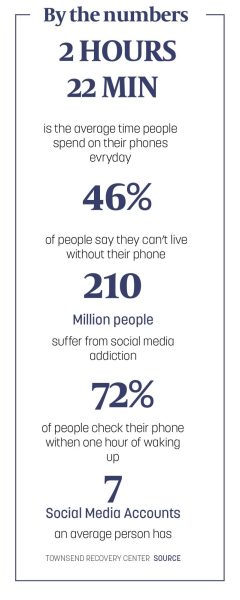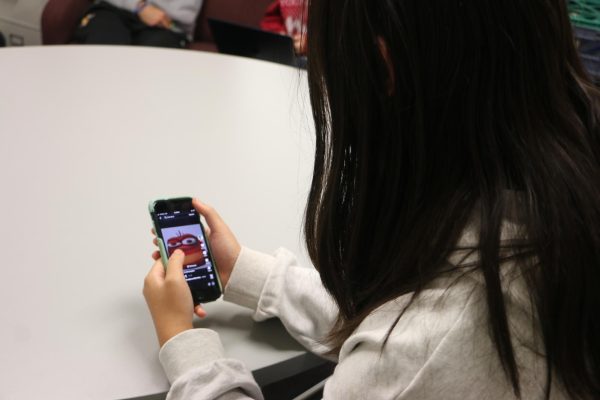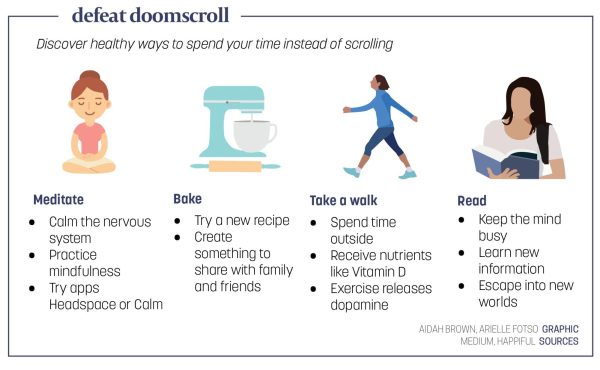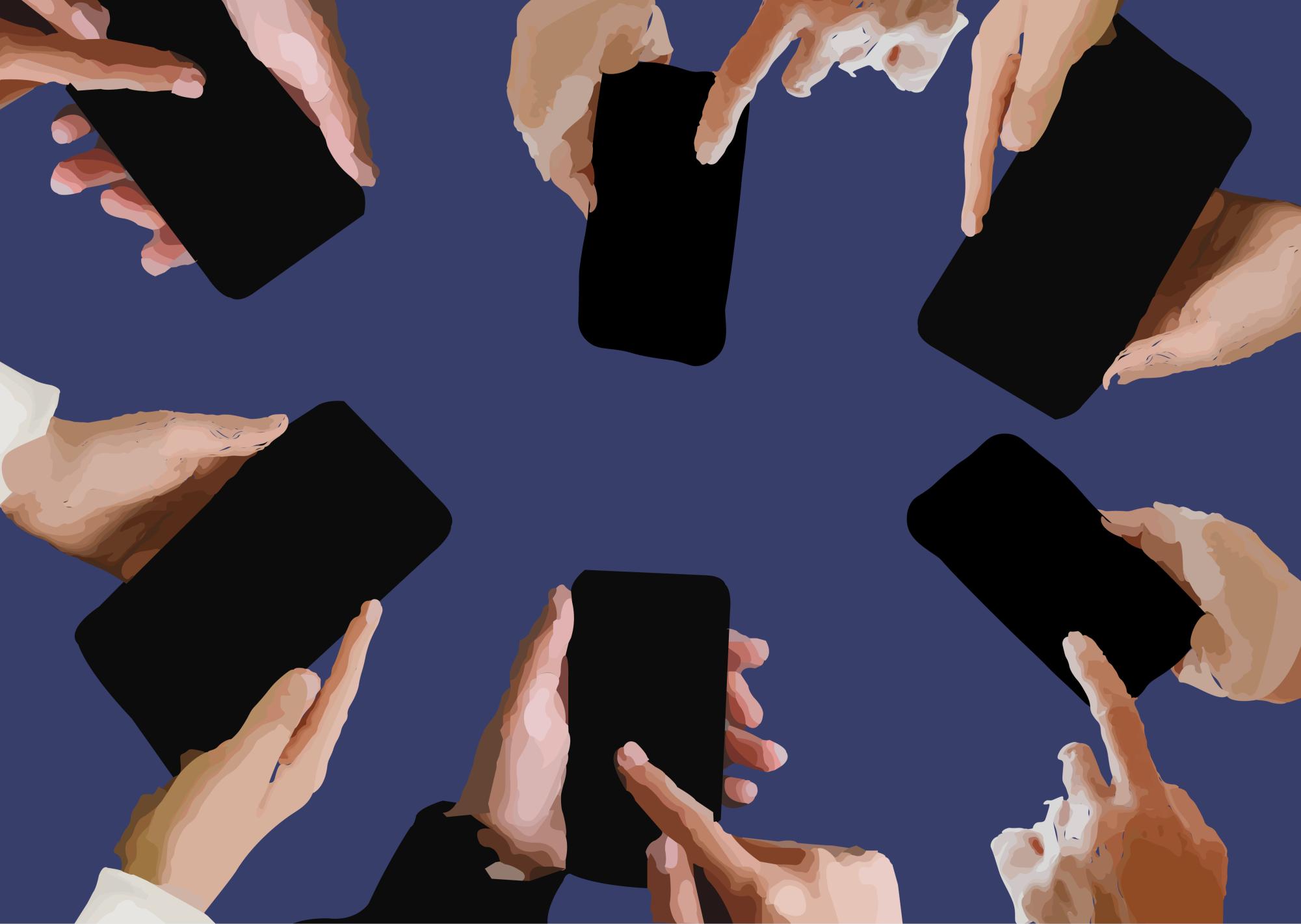For senior Lala Xiong, social media can be an addictive and exciting experience that is hard to control effectively.
“I enjoy social media because it’s entertaining and my friends are all on it. I guess I find it hard to control my usage on social media. Even when I have a test coming up I’ll be on social media instead of studying,” Xiong said. “I think what’s hard about limiting social media use is how easy it is to fill time. Especially social media apps with short videos, I think I’m going to stop after five one-minute videos and end up spending my whole night scrolling.”
Similarly, junior Novak Golubovic said he enjoys connecting with distant friends over social media, but said most teenagers overuse social media platforms.
“Social media allows me to connect with my friends in Carmel and New York. Further, I get to laugh at the many bizarre reels in my ‘for you’ page,” Golubovic said. “Social media employs algorithms that aim to provide every individual with a for you page tailored to their liking, causing individuals to endlessly scroll on the platforms as it plays on their dopamine.”

negative mental health effects of social media
Xiong and Golubovic aren’t alone in their use of social media and difficulty limiting social media scrolling. According to a 2024 study conducted by the American Psychological Association (APA), teenagers spend around 4.8 hours on social media platforms daily, with 37% of teens reporting a social media screen time of five or more hours. Furthermore, the study also reported 41% of teens with the highest social media usage report having poor or very poor mental health, 17% report having body image issues and 10% report having suicidal thoughts. These statistics illustrate the very tangible negative impact excessive social media usage has on impressionable teenagers.
In response to these statistics, freshman counselor David Schelper said he’s seen a lot of students who feel more isolated, have more insecurities and lose track of time because of excessive social media usage.
“I always think of the teenager who just split from a friend group and is isolated and lonely. The teen gets pictures/snaps/posts about how much fun their former friend group is having,” Schelper said. “Other than that, social media often takes up too much time away from other things like spending time with family and schoolwork.”
Xiong said she agreed with Schelper’s assessment and said social media platforms are heavily edited and fake which can give people false impressions of others’ lives, but she said she has tried to not fall into the trap of perfection seen on social media.
“The negative of social media is it can be very toxic. Social media is not real life, it’s filtered and edited. People can get too absorbed and lose track of their real life,” Xiong said. “I would say I don’t get FOMO (fear of missing out). When I see someone doing something cool, I’m not really jealous because I get they’re only showing a small part of their life. I do the same thing. Instead, I just steal their ideas for my vacations or whatever.”
Golubovic said his mental health has gotten worse because of social media usage and it has become easier to compare oneself to others online.
“I believe social media has to a greater extent negatively impacted my life than improved it. Social media, as I see it, is a great waste of time, and I believe that I could better utilize my afternoons,” Golubovic said. “I think at times social media espouses ideas that can be very harmful, so, yes, my mental health has been affected. Social media has caused me to compare myself to others. It often promotes outlandish lifestyles that causes one to feel inadequate.”
Schelper said social media does create negative body image and can make teens feel inferior to their peers.
“Social media can influence a teen’s awareness of how everyone is supposed to look and behave,” Schelper said. “Most posts are positive and happy, and it portrays their life as being ‘perfect.’ So, this may lead to body image dissatisfaction, negative outlooks on their own lives, fear of missing out on all the fun that’s happening and just overall lower life satisfaction.”
effects on education
Schelper also said excessive social media usage has been manifesting in abnormal interpersonal connections and reduced comprehension.
“I have noticed over the years that students are less engaged with adults,” he said. “Instead of making eye contact and being ‘awkward’ by saying hi to an adult, many teens just look down (or at their phone) hoping to get away. I think the amount of time on social media has definitely impacted teens’ interpersonal skills. We do have students who are addicted to social media (and gaming), and it absolutely is affecting their schoolwork”

Xiong said her focus and attention to schoolwork has been significantly decreased by her social media scrolling.
“When I’ve been doomscrolling (spending too much time consuming negative news) for an hour and I finally choose to stop, I’m annoyed that I wasted all my time. So in that way, not having social media would make me more productive and happier,” Xiong said. “My focus has definitely decreased because of social media. When I hear an Instagram notification I will most likely abandon my studies.”
Golubovic said he agreed and that his focus has also been heavily impacted.
“My focus has been negatively impacted as a result of social media use,” Golubovic said. “I often find myself struggling to get back into homework after a session of social media scrolling.”
Golubovic also said physical health could also be impacted by social media doomscrolling.
“Social media promotes content such as ‘mukbang’ (people eating tons of food), which I view as a very concerning trend, to its viewers,” Golubovic said. “Although I certainly will stay away from such pastimes, the effect it has on physical health goals can be detrimental.”
Potential Solutions for Doomscrolling
Overall, Schelper said social media usage is a hard problem to solve, but parents and students can implement measures to make sure kids aren’t affected by a social media addiction their entire lives.
“I think the genie has already been let out of the bottle. Like I said before, it’s all about moderation,” she said. “Ideally, teens need to find purpose in other aspects of their lives (clubs, sports, church, activities, friends, etc.) and social media has to be a small part of their lives but it can’t be their main purpose. Instilling boundaries when kids get their first phone and parents modeling appropriate use of social media can help. At home, come up with a policy that states phones shut down by a certain time. Have the parents do this as well with the students and see what kind of benefits could come from a ‘cell phone fast.”

Xiong said it would be difficult for schools to do a lot to limit social media usage, but schools should teach better social media use.
“I don’t think schools can do much to limit social media usage. Even if they ban phones or social media, that doesn’t mean kids won’t still be addicted at home. I think one thing to do is teach internet safety,” Xiong said. “This will help kids with social media addictions not post things that will haunt them later, fall for scams or get hacked. Even if it may not stop the addiction, it will reduce the harm.”


